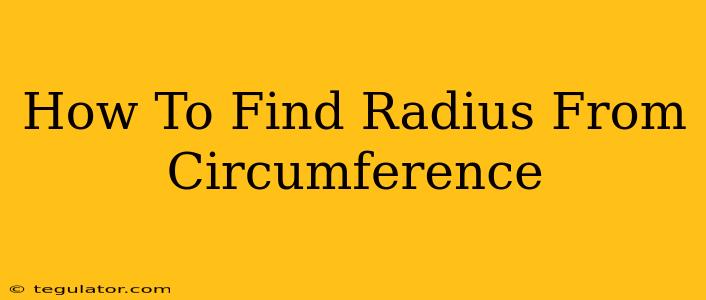Knowing how to find the radius from the circumference is a fundamental skill in geometry and has applications in various fields. Whether you're tackling a math problem, designing a circular object, or working on a real-world application, understanding this relationship is crucial. This comprehensive guide will walk you through the process, explaining the formula and providing practical examples.
Understanding the Relationship Between Radius and Circumference
The circumference of a circle is the distance around its edge. The radius, on the other hand, is the distance from the center of the circle to any point on its edge. These two measurements are intrinsically linked through a simple mathematical formula.
The Key Formula
The formula that connects the circumference (C) and radius (r) of a circle is:
C = 2πr
Where:
- C represents the circumference
- r represents the radius
- π (pi) is a mathematical constant, approximately equal to 3.14159
To find the radius from the circumference, we need to rearrange this formula to solve for 'r'.
Calculating Radius from Circumference: A Step-by-Step Guide
Here's how to derive the formula and apply it:
-
Start with the circumference formula: C = 2πr
-
Isolate the radius (r): To get 'r' by itself, we divide both sides of the equation by 2π:
r = C / 2π
-
Substitute the known circumference: Now, substitute the given circumference (C) into the equation.
-
Calculate the radius: Perform the calculation to find the value of 'r'.
Practical Examples
Let's illustrate this with a few examples:
Example 1:
A circle has a circumference of 25 centimeters. Find its radius.
-
Use the formula: r = C / 2π
-
Substitute: r = 25 cm / (2 * 3.14159)
-
Calculate: r ≈ 3.98 cm
Therefore, the radius of the circle is approximately 3.98 centimeters.
Example 2:
A circular track has a circumference of 400 meters. What is its radius?
-
Use the formula: r = C / 2π
-
Substitute: r = 400 m / (2 * 3.14159)
-
Calculate: r ≈ 63.66 m
The radius of the circular track is approximately 63.66 meters.
Beyond the Basics: Applications and Further Exploration
Understanding how to find the radius from the circumference is a fundamental concept with wide-ranging applications, including:
- Engineering and Design: Calculating dimensions for circular components in various projects.
- Construction: Determining the radius of curved structures.
- Cartography: Working with map projections and geographical calculations.
- Astronomy: Calculating distances and sizes of celestial bodies (though often using more complex formulas).
This skill is a cornerstone of many more advanced geometric calculations. Mastering this basic formula will provide a solid foundation for tackling more complex problems involving circles and their properties. So, practice the steps, remember the formula, and you'll be well on your way to confidently solving problems involving radius and circumference.

